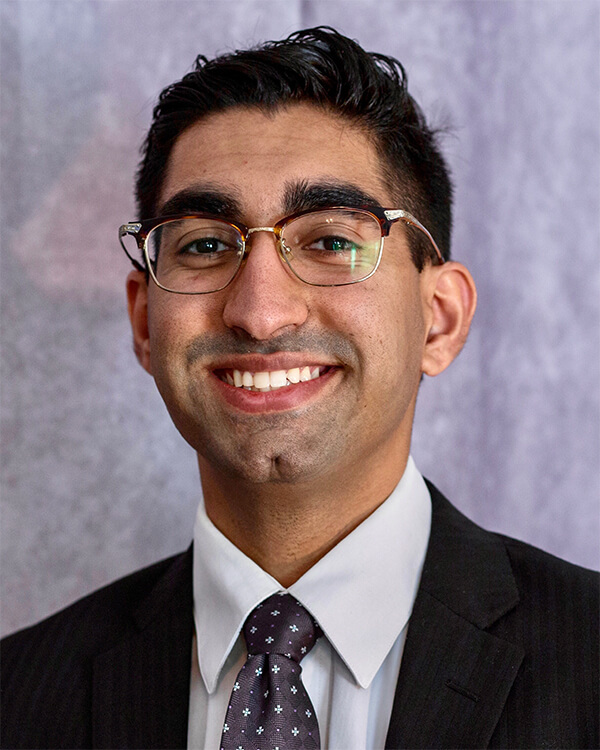Where are they now? Devan Baijal ’19
Where are they now? Devan Baijal ’19
This environmental health major is now a fourth-year medical student on his way to becoming a sports psychiatrist

Devan Baijal ’19
Devan Baijal grew up around the world, literally. His parents worked for global automotive companies and had assignments everywhere from Detroit to Nashville to Melbourne, Australia, and Yokohama, Japan. His international high school had just 100 students in it with only 33 in his graduation class. When it came to sports, everyone made every team.
“Interestingly, though, I was the first person in the school’s history to ever get cut from the basketball team,” laughs Baijal. “That was a pretty funny experience—I did manage to find a role as the team’s stats person and informal cheerleader though.”
Growing up in so many places gave Baijal an appreciation for different perspectives and opportunities to hone his social skills. To make friends, he often leaned into his sense of humor. He loved—and still loves—to make people laugh, and he continues to enjoy sports (but mostly from the sidelines).
Today, Baijal is a fourth-year medical student at Kansas City University in Joplin, Missouri. His goal is to become a sports psychiatrist. Someday, he’d like to work for a major sports team or college athletics department.
“Athletes get a lot of physical coaching and I want to provide them the same kind of support from a mental health perspective,” he says. “Think about it—athletes get treated for torn muscles and broken bones. They should also get treatment to help them navigate their lives, schedules, and the challenges of being an athlete.”
Here, Baijal talks about mental health, sports, and education.
How did you get interested in the mental health field?
I was 16 years old when Robin Williams died by suicide in 2014. I was such a big fan of his. Dead Poets Society and Good Will Hunting were my favorite movies. I couldn’t figure out how someone as seemingly happy and as funny as him could end his life. This marked the beginning of my interest in mental health. My best friend from high school also died by suicide in 2017, when I was a college junior. His death really affected me and pointed me in this career direction. Then in 2018, when Kevin Love from the NBA’s Cleveland Cavaliers started talking publicly about having bouts of anxiety and panic attacks, I took notice. His honesty was admirable and showed that even someone we see as a big, strong basketball player struggles. His candor affirmed my goals.
What have stories from athletes such as Simone Biles and Damar Hamlin’s shown you?
Biles’ story during the Olympics really helped change the conversation about athletes, mental health, and burnout. Getting the mental health support they need will help athletes manage stress and anxiety, prevent burnout, and be as healthy as possible, whether they are professional, high school, or collegiate athletes. In a different way, Hamlin’s story prompted a wave of collective, societal concern and a matched rallying of hope. So many people were deeply affected by his collapse on the field. People we think of as heroes, including young people who seem like they should be invincible but show us they aren’t, remind us that our lives can change quickly. Having the mental health tools to manage these changes is vital to our overall well-being.
How have you managed the rigors of medical school from a mental health perspective?
Adjusting to medical school is hard and Joplin was a new, unfamiliar place, far away from my friends in big cities on the east coast. But, I started accessing the campus counseling resources and I really leaned into yoga and meditation. I also spend as much time as I can with family and friends—I get energy from them. Early in my medical school career, I founded the Mental Health in Medicine Club and a peer support organization. As a young physician about to endure intense weeks in my multi-year residency program, I don’t want to burn out.
How did Rochester prepare you for where you are today?
Rochester taught me how to step out of my comfort zone and inspired me to try everything. I was an environmental health major with a minor in business. I also served as vice president of my class for two years, senior giving co-chair, Student Alumni Ambassador, and a first-year resident advisor. I loved Rochester’s flexible curriculum. I even took a humor writing class.
What’s a key issue for athletes and their mental health?
Their identity. After high school, college, or a big event, athletes often wonder who they are after the competition ends. So much of who they are is tied to their sport. Transition can be a difficult time from a mental health perspective.
What do you want people to understand about sports and mental health?
People may look at athletes who have achieved a lot – be it a gold medal, All-American status, or high school regional champ—and think “that athlete has it all.” Just remember, we all go through experiences differently, we are all human, and we all need to feel connected, valued, and seen.
Get connected
Attend a local event, join one of our networks, or participate in a group such as the University’s Young Alumni Council. Also, consider becoming part of The Meliora Collective. Designed for alumni, parents, faculty, staff, and undergraduate and graduate students, this unique online platform helps foster personal and professional exploration.
—Kristine Kappel Thompson, February 2023


